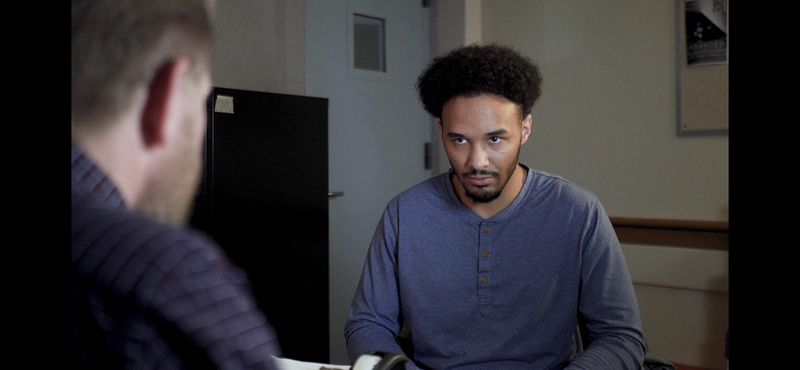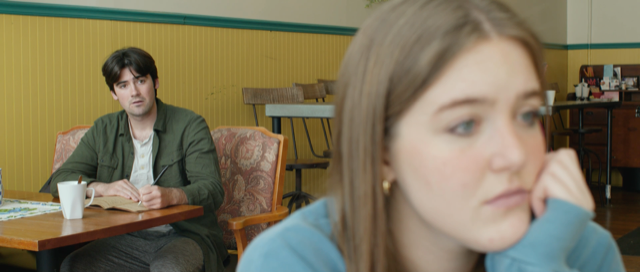
A Student’s Voice Against Authority’s Silence
MOVIE REVIEW
Sisyphus Unbound
–
Genre: Drama, Short
Year Released: 2023
Runtime: 8m
Director(s): Ryan Fleming
Writer(s): Ryan Fleming
Cast: Frederick J. Todd, Timothy J. Cox, Emerson Adams
Where to Watch: TBD
RAVING REVIEW: There’s something about a short film that invites you into its world without trying to amaze, instead relying on tension, performance, and atmosphere to pull you in. That’s the quiet power behind SISYPHUS UNBOUND, a brisk character piece that unfolds like a pressure cooker mid-boil. This project focuses more on emotional undercurrents than narrative. It doesn’t aim to reinvent storytelling, but it does lean hard into the discomfort of seeking approval from someone who’s already decided you don’t deserve it.
The plot unfolds in a confined space—a meeting between a hopeful college student and a jaded professor. Virgil, the student in question, arrives with a manuscript in hand, a bit of anxiety, and the weight of unspoken stakes hanging overhead. All he wants is feedback, perhaps even validation. What he gets is something closer to academic hazing. The professor, Laymen, doesn’t critique the work as much as he shrugs it off, wielding authority like a weapon with no purpose. It's a dynamic built not on constructive feedback, but on dominance masked as mentorship.
This setup isn't unfamiliar in storytelling, but the specificity of its execution helps it resonate. The film captures something many people can relate to—the moment you realize someone you admire, or at least rely on, isn’t rooting for you. SISYPHUS UNBOUND doesn’t spell this out; it lets the discomfort settle slowly. The emotional architecture is built through gestures, glances, and silences. Virgil’s movements, downcast eyes, and nervous habits speak louder than his words. Frederick J. Todd plays him with an internal focus that feels authentic, making Virgil less a dramatic lead and more an everyperson stuck in a system that prefers obedience to originality.
Across from him, Timothy J. Cox’s performance as Laymen delivers the cold detachment that can’t be chalked up to simple cruelty. There’s an institutional rot underneath his demeanor. His dialogue cuts, but it’s never theatrical—just casually belittling, as if it’s second nature. Cox walks a fine line here, portraying the kind of academic gatekeeper who sees mentorship as a one-way street.
Technically, the film does a solid job working within its limits. Close-up shots and over-the-shoulder angles box the characters into a frame that feels more like a trap than a conversation. That might be a product of the shooting location, but it works thematically. The office feels like a vacuum where no sound escapes and no progress is made.
Thematically, SISYPHUS UNBOUND has a lot on its plate. There’s a glance at elitism, a hint at generational divide, and plenty of commentary on how institutions resist new voices. But with a runtime under ten minutes, most of these threads are left underdeveloped. Laymen's antagonism lacks context, and Virgil’s journey is more an emotional sketch than a transformation. The film gestures toward deeper meaning without giving those ideas room to breathe. It plants the seeds but doesn’t have time to water them.
The supporting character of Gwen, Layman’s daughter, briefly offers a counterpoint to her father’s cold demeanor. She’s polite and inquisitive, and she introduces a softness that the rest of the story lacks. Her limited screen time, however, means she functions more as a thematic device than a character. In a longer cut, she could have been a lens through which to explore Laymen’s contradictions or even Virgil’s sense of hope. Here, she’s more a reminder that empathy exists, not where you might expect it.
The film ends not with a grand confrontation but a moment of quiet resolve. That choice feels earned. SISYPHUS UNBOUND doesn’t pretend everything’s been fixed. It just leaves the door cracked open. Virgil’s fight isn’t over—it’s just beginning. And while there’s no guarantee he’ll win, the point is that he doesn’t stop pushing.
This short is an excellent introduction to Ryan Fleming’s work. It grasps mood and character-driven tension. The story isn’t explosive, but it sticks with you. Fleming knows how to direct emotion through physical space and silence.
SISYPHUS UNBOUND might not reach its full potential, but it knows what it wants to say: institutions often confuse criticism with control, and creativity usually survives despite that. It’s a brief encounter with lasting implications. With more time, it could have unpacked its themes with more force. But even as it is, it finds its impact through restraint and intention. Sometimes, just getting back up the hill is the story.
Please visit https://linktr.ee/overlyhonestr for more reviews.
You can follow me on Letterboxd, Instagram, Twitter, and YouTube. My social media accounts can also be found on most platforms by searching Overly Honest Reviews.
I’m always happy to hear from my readers; please say hi or send me any questions about movies.
[photo courtesy of MAFIA PRODUCTIONS]
DISCLAIMER:
At Overly Honest Movie Reviews, we value honesty and transparency. Occasionally, we receive free items for review, including DVDs, Blu-rays, CDs, Vinyl, Books, etc. We assure you that these arrangements do not influence our reviews, as we are committed to providing unbiased and sincere evaluations. We aim to help you make informed entertainment choices regardless of our relationship with distributors or producers.
Amazon Affiliate Links:
Additionally, this site contains Amazon affiliate links. If you purchase through these links, we may receive a commission. This affiliate arrangement does not affect our commitment to honest reviews and helps support our site. We appreciate your trust and support in navigating these links.



Average Rating